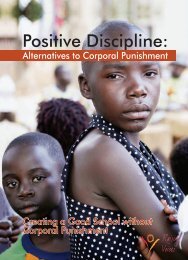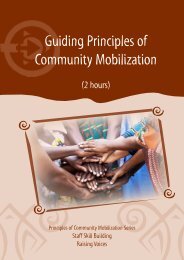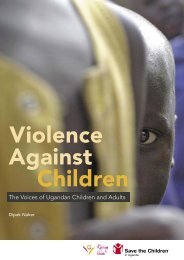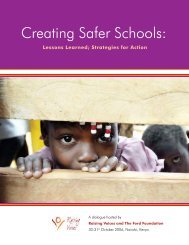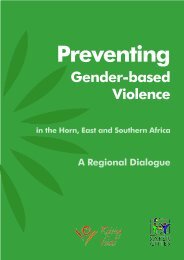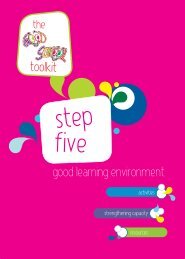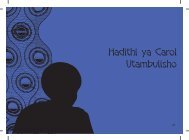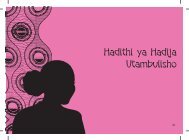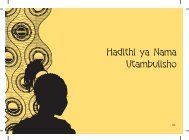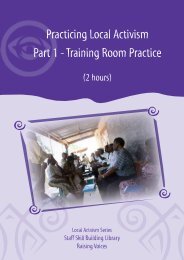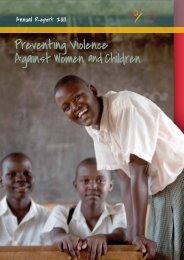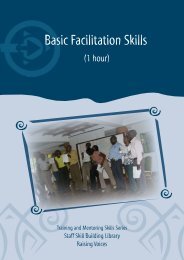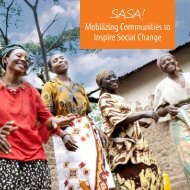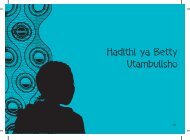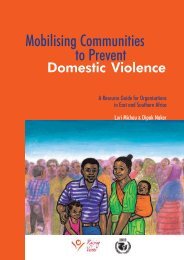CA C 1 - Raising Voices
CA C 1 - Raising Voices
CA C 1 - Raising Voices
You also want an ePaper? Increase the reach of your titles
YUMPU automatically turns print PDFs into web optimized ePapers that Google loves.
DVPP case study<br />
230<br />
DVPP case study<br />
■ Christian religious leaders (3) have delivered sermons on the importance of violence-free homes<br />
and even held seminars for other priests. They have also held video shows for their parishioners and<br />
initiated booklet clubs within their youth and mothers groups. Muslim leaders (2) hold special classes<br />
after Friday prayers for men and women and revived a court system, staffed by the resource<br />
persons, that aims to increase justice for women.<br />
■ Health care providers (3) within Kampala City Council system hold regular meetings with other<br />
service providers to improve quality of care, present talks at immunization clinics and regular<br />
discussions within the waiting rooms on domestic violence, and are currently developing screening<br />
procedures to integrate domestic violence in their client protocols.<br />
Staff capacity building is also an integral part of the department’s work. All staff meet weekly to<br />
‘check-in’ with others about the successes and challenges of their departments, to collectively problemsolve,<br />
and to discuss lessons learned. This has helped build cohesion within the program and<br />
solidarity among staff. All staff members also participate in the Community Activism Course and in a<br />
three-hour training every fortnight, which is often facilitated by themselves.<br />
Media and Events<br />
This department works with the print and electronic media to promote discussion and public debate<br />
about domestic violence. Much of the media work reaches a nation-wide audience, yet there are other<br />
activities reaching out specifically to the Kawempe community. Almost 90 talk and drama radio<br />
programs have been aired on several radio stations within greater Kampala on topics including<br />
consequences of domestic violence, bride price, gender, women and human rights, etc. Furthermore,<br />
a weekly column, “Thinking Aloud”, and colorful ‘advertisements’ are published every Sunday about<br />
related topics, such as masculinity, intimacy in relationships, emotional violence, and solidarity among<br />
women, in nationally distributed newspapers in both English and Luganda.<br />
The Media and Events department is also working to create a forum for prominent journalists and<br />
editors to discuss the portrayal of women and violence in the media. Key journalists, the media<br />
establishment, and other NGOs have been engaged in an analysis of how women are portrayed in<br />
the media, and efforts have been made to increase ethical reporting and more balanced analysis of<br />
women’s issues and to decrease sensationalized reporting on domestic violence. This is done through<br />
seminars for journalists and one-to-one work with senior journalists.<br />
Advocacy<br />
In June 2002, as a result of an internal review, the activities of the Advocacy department were<br />
integrated into other program areas, since there was some overlap between the departments in the<br />
groups being reached. For example, the Local Council leaders are also reached through the Building<br />
Capacity and Local Activism departments. Furthermore, the very active groups of community<br />
volunteers have now taken many of the local advocacy activities.<br />
The aim of the department was to influence local leaders, professionals, and community members to<br />
reflect on and act to prevent the domestic violence they see within their communities. In Uganda, local<br />
Mobilising Communities to Prevent Domestic Violence



